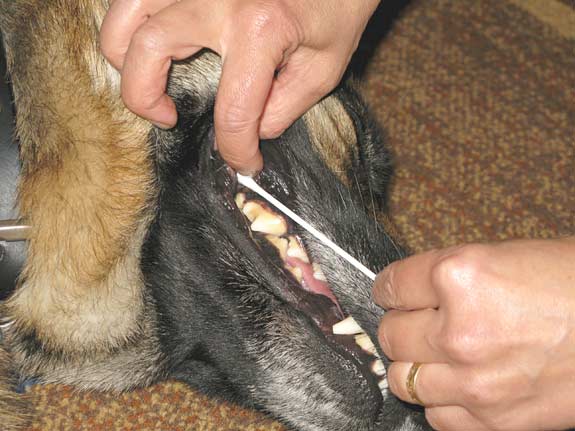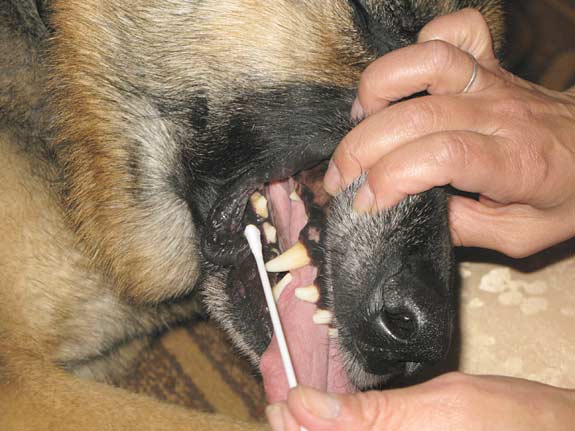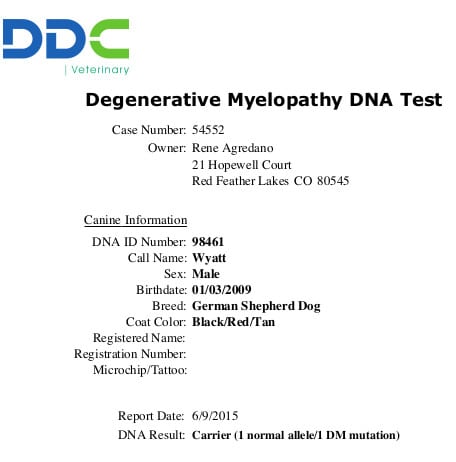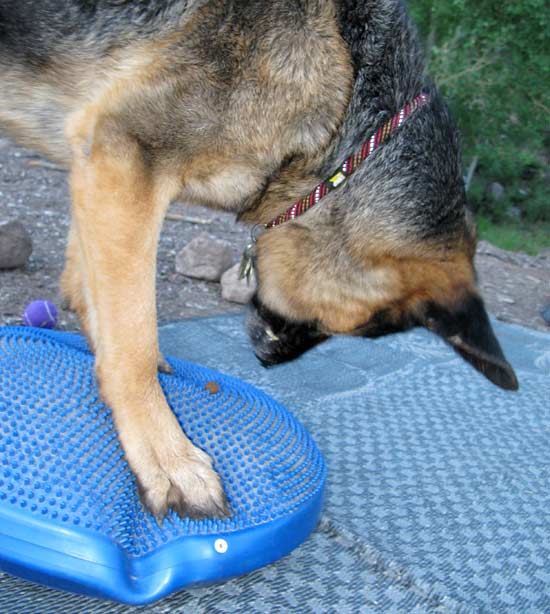DNA home test kits for dogs and cats have been around for years. We never gave them much thought until we learned how useful they can be for a pet’s health care needs.
You’re probably familiar with DNA screenings that can reveal a pet’s breed backgrounds. This is a fun way to discover why your pet shows certain behaviors, like obsessing over Frisbees or nipping at the heels of humans. Knowing this about your dog or cat goes a long way toward a well-balanced animal.
Does Your Pet Have an Inherited Disease?
Here’s an even better reason to get your pet’s DNA tested: inherited disease screenings. For example, DNA tests can find gene mutations like the Multidrug Sensitivity (MDR1) gene, which commonly affects herding breeds and makes them susceptible to certain drugs (like the heartworm drug Ivermectin). If a dog has the MDR1 gene and they receive one of those drugs, it could result in death.
The test results can provide useful information as our pet ages, but the decision to screen for inherited diseases isn’t for everybody.
- If you find out your animal has a certain predisposition to certain diseases, what will you do about it?
- Will you arm yourself with information about the disease and be ready for battle?
- Or will you constantly fret, looking for signs that your pet is coming down with it?
- Do you really want to know?
Wyatt Ray Gets a DNA Screening
The emotional ramifications of DNA screening weighed heavy on us recently, when it was brought to our attention that Tripawds Spokesdog Wyatt Ray is a prime candidate for Degenerative Myleopathy (DM). This is a brutal, degenerative and fatal disease of the spinal cord that kills thousands of dogs each year, mainly German Shepherds.

We decided that since Tripawds are already dealing with a physiological disadvantage that can grow over time, we wanted to know if Wyatt is a carrier of DM. We felt that knowing would help us become well prepared with information that could help him (and us) cope with this disease.
To get started, we contacted DDC Diagnostics Center (DDC) in Fairfield, Ohio. You’ll find several DNA screening companies for pets, but we reached out to DDC because
- DDC is one of the oldest and most respected DNA screening labs for humans and pets.
- They have a state-of-the-art veterinary service that screens cats, dogs, horses, and birds
- The company’s technology is recognized by the several industry organizations, including the Orthopaedic Foundation for Animals.
- DDC offers screenings for conditions like Exercise Induced Collapse (EIC), Centronuclear Myopathy in Labrador Retrievers, von Willebrand’s Disease and the feline test for Polycystic Kidney Disease I.
 When we asked about their Canine-Disease-Degenerative Myelopathy DNA Test and told DDC we wanted to share our findings about this procedure with the Tripawds community, they kindly sent us a complimentary Canine DNA Sample Collection Kit and provided complimentary results. Here’s how it worked:
When we asked about their Canine-Disease-Degenerative Myelopathy DNA Test and told DDC we wanted to share our findings about this procedure with the Tripawds community, they kindly sent us a complimentary Canine DNA Sample Collection Kit and provided complimentary results. Here’s how it worked:
DNA Screening for Pets is Easy
Can you remember back to junior high biology class, when you collected cells from your cheek by scraping a cotton swab against the inside of your mouth? The DNA screening process is just like that, only this time you swab your pet’s cheek. After a few swipes with the Collection Kit’s cotton swabs, you put the swabs in your Sample Collection Kit envelope and mail it off to DDC.

Once the kit arrives back at DDC labs, here’s how it gets analyzed:
“The technology we use most often is PCR or polymerase chain reaction testing. First we isolate pure DNA from the cheek swab by removing all the proteins and other things that can be found within a cell.
The DNA is then placed into a thermocycler along with fluorescent primers for specific ‘loci’ or locations on the DNA, which enable the system to locate specific fragments of DNA. The thermocycler is set to cycle through a certain number of temperature cycles. Throughout the cycles, the primer finds specific areas within the DNA that are repeated and amplifies those areas.
After the DNA has been amplified, it is in an ABI Prism Genetic Analyzer for capillary electrophoresis. In this process, the DNA loci are mapped and data on each is collected. This results in a comprehensive ‘profile’ of each individual. These individual profiles are then reviewed by a trained, experienced Ph.D.”

And the Results Are . . .
Less than one week later, our test results arrived via email. Here’s what it said:
Wyatt is a Carrier, which means his DNA has 1 normal allele and 1 with a DM mutation. What does this mean? Well:
- A allele is one of two or more versions of a gene. An individual inherits two alleles for each gene, one from each parent.
- A carrier is an individual who carries and is capable of passing on a genetic mutation associated with a disease and may or may not display disease symptoms. Carriers are associated with diseases inherited as recessive traits. In order to have the disease, an individual must have inherited mutated alleles from both parents. An individual having one normal allele and one mutated allele does not have the disease. Two carriers may produce children with the disease.

At first we panicked; Wyatt? A carrier?! But once we took an online genetics refresher we realized this was good news. As a carrier, his chances of developing the disease are low. He would have a 50% chance of carrying it to his offspring, but since he’s neutered, that’s a non-issue.
Although we wished the DDC lab report would have come with a “Genetics for Idiots” explanation, once we made a call to the lab and spoke with customer service reps, we got a better explanation of what the report meant. They were also kind enough to share some links to educate us about current DM research taking place.
We are thankful that Wyatt isn’t at risk of developing DM. If he was, we were told by canine rehab practitioner Debbie Gross that the exercises recommended for Tripawds in our e-book, Loving Life on Three Legs: core strengthening, passive range of motion and balance games, are exactly what she would provide for dogs with DM.

Knowing this information made us feel empowered and optimistic. With one common German Shepherd disease less likely to challenge Wyatt in his adulthood, we can focus on other things that will give him a great quality of life.
One way to do that is to have a complete DNA screening test performed, which we will do next with another type of screening test called the Mars Veterinary Wisdom Panel . Stay tuned for those details.
DNA testing is more than finding out if your Great Dane is part Chihuahua. Every pet parent should consider it an important investment in your pet’s health that can save their life.
Learn more about DNA screening for pets at DDC Veterinary DNA Testing.
We used Wisdom Panel on all 3 of ours and in two cases I can say there is not a chance in the world they are any of the 3 breeds that Wisdom Panel says they are…waste of money. If you have companies that are more accurate, let me know.
Thanks for sharing your experience! I think that a lot of people are really surprised by the breed testing results, but I do feel these tests have a lot of value when it comes to health screening, just as they do with humans. I’m not sure how much more accurate a DNA test can be, but you can give DDC a call to ask how theirs differs from the Wisdom Panel.
Does it screen for cancer carrying genes? I know I would sit here and panic if it did. I wonder what a full panel would run
Michelle & Angel Sassy
Not this test Michelle, but other companies are coming out with a limited number of cancer screening tests. Their reliability is iffy though. We wrote about them a while back:
https://tripawds.com/2012/08/24/the-facts-about-dog-cancer-screening-tests/
https://tripawds.com/2010/10/26/oncopet-detects-cancer-markers-in-dogs/
Love the picture of Jerry “obsess i ng”! Such a handsome obsessive face!
Interesting indeed! Thanks for sharing!!
A d such a RELIEF to know Wyatt is just a carrier.
! But as you said, he won’t be “carrying” it anywhere as he’s snipped!
So, will this other test show if any other disease predispositions?
Yeah thanks Sally! This specific test won’t show other diseases but you can order a full panel and get one that does, or order individual screenings as we did. The number of diseases these tests can pick up is amazing, things you never thought about or heard of!